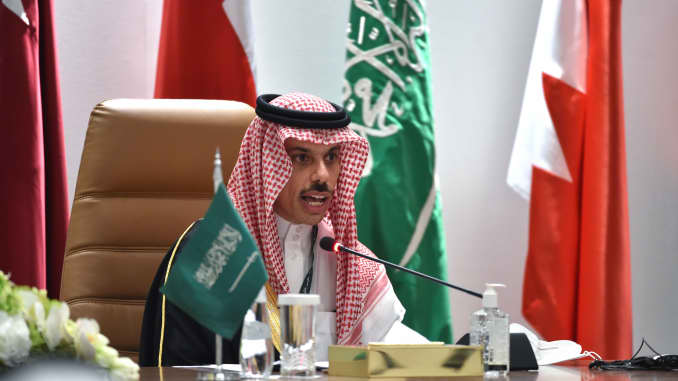
- The end of the Gulf dispute is a win for the region, Saudi Arabia’s foreign minister, Faisal bin Farhan al-Saud, told CNBC after announcing that relations between Qatar and four Arab countries have been fully restored.
- The Al-Ula declaration resolves all of the outstanding issues that Qatar and other Arab nations had, said al-Saud.
- Saudi Arabia, the UAE, Bahrain and Egypt in 2017 imposed a travel, trade and diplomatic blockade on Qatar, accusing it of supporting terrorism. Doha has denied these allegations.
Saudi Arabia on Monday opened its airspace, land and sea borders to Qatar. Saudi Crown Prince Mohammed bin Salman welcomed Qatar’s emir, Sheikh Tamim bin Hamad al-Thani, with a hug when the latter arrived on Saudi soil.
Al-Saud said he thinks the deal will be a “very, very strong basis” for regional stability going forward.
Asked if it was a win for the outgoing Trump administration, al-Saud said: “I think this agreement racks up a win for the region, first of all, a win for all of us.”
Saudi Arabia on Monday opened its airspace, land and sea borders to Qatar. Saudi Crown Prince Mohammed bin Salman welcomed Qatar’s emir, Sheikh Tamim bin Hamad al-Thani, with a hug when the latter arrived on Saudi soil.
Al-Saud said he thinks the deal will be a “very, very strong basis” for regional stability going forward.
Asked if it was a win for the outgoing Trump administration, al-Saud said: “I think this agreement racks up a win for the region, first of all, a win for all of us.”
Still, he acknowledged support from the U.S. and Kuwait, which has been mediating between Saudi Arabia and Qatar. “Absolutely, President Trump and (White House senior advisor) Jared Kushner contributed to reaching this agreement, working very closely with Kuwait, who has been working on this for some time,” he told CNBC’s Hadley Gamble.
Not about Iran or Washington
Saudi Crown Prince Mohammed bin Salman said on Tuesday that GCC unity is needed to counter challenges in the region, “particularly the threats posed by the Iranian regime’s nuclear program,” according to Arab News.
Foreign minister al-Saud told CNBC the deal is for the good of the region’s security. “This agreement is not about Iran or about anyone else. It’s about bringing our countries together and making sure that we work together to deliver prosperity and security for our people.”
When asked if Saudi Arabia may be trying to get into President-elect Joe Biden’s good graces before the inauguration, he said: “This isn’t about Washington, it’s about the region and the priorities that our countries have.”
Biden is expected to roll back U.S. support for the kingdom when he takes office.
The Saudi foreign minister said the Gulf nations will cooperate on security issues as well as economic integration.
“We believe very strongly that the Al-Ula declaration resolves all of the outstanding issues and concerns that the countries’ parties would have had, and that it lays the basis for now a very strong, cooperative agenda for the GCC, and also for the region,” he said.
‘First step’
However, one diplomat called for caution.
Michael Greenwald, former U.S. Treasury attache to Qatar and Kuwait, said the agreement was just a “first step.”
“This is a political resolution,” he told CNBC’s “Capital Connection” on Wednesday. He said the opening of airspace is helpful ahead of the Qatar 2022 World Cup, and the nations want to “boost themselves economically” while preparing for a new U.S. administration.
But Greenwald, who is also a director at investment management firm Tiedemann Advisors, said more needs to be done. “There needs to be a much stronger, detailed framework put in place so that this does not happen again,” he said.
No comments:
Post a Comment